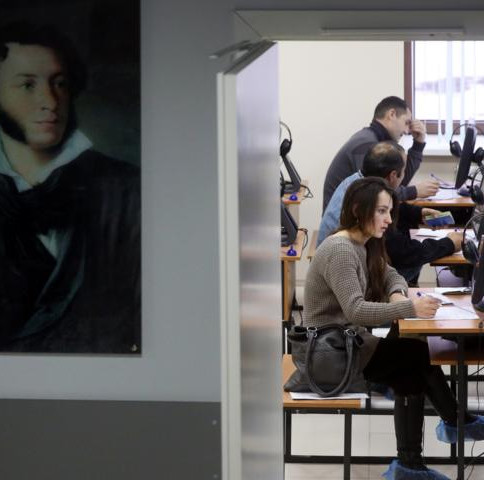US President Donald Trump said that "Russia must get out of Venezuela". According to him, Washington is considering all the options for this to be achieved. He said this on March 27 during a White House meeting with the spouse of the opposition leader of Venezuela Juan Guaidó.
Answering a question of the presidential press pool about whether Washington sent its message to Moscow with US President's National Security Adviser John Bolton or the United States Ambassador to the United Nations, Trump said: "They know, they know." At the same time, however, he did not specify the one he was talking about.
The Kremlin said the following via a spokesman for the Russian President: "We do not think that third countries should be concerned about our bilateral relations with some states. We are not interfering in the internal affairs of Venezuela in any way... we hope that third countries will follow our example and let Venezuelans decide their own fate.
As for the United States of America, it has a presence in many parts of the world, but no one tells them where they should be and where they shouldn't be. Therefore, we would certainly like to rely on the mutual respect for our right to build relations with any countries that meet our interests and the interests of these countries." In short, Trump's threatening tone did not impress the Kremlin at all.
Commenting on the American leader's statement that Russia should withdraw from Venezuela, head of the Foreign Affairs Committee of the Russian Federation Council Konstantin Kosachev pointed out that the President of the United States is trying to interfere in the relations of two sovereign states.
"Donald Trump is trying to brazenly interfere in bilateral relations of two sovereign countries – Russia and Venezuela. He is trying to dictate us what we can and cannot do in a country that is our partner, that is a recognized member of the international community and part of the United Nations. A country that is not exposed to any sanctions in terms of military-technical cooperation, with whom Russia is facilitating cooperation in this area quite legally, within international law," Kosachev said.
Trump spoke sharply and perhaps recklessly, because Russia has almost no presence in Venezuela. Moreover, Russia has never interfered in the internal affairs of Venezuela, while the Americans are typically more impudent in this regard. Just take the recognition of Juan Guaidó as the head of state alone and the pressure on Venezuela's neighbors to support him.
Let us recall that the situation in Venezuela escalated on January 23 this year, when after a wave of mass protests Parliament speaker Juan Guaidó proclaimed himself the country's interim president. The United States, most members of the European Union and Latin American countries almost immediately recognized him as the legitimate head of state. In their turn, Russia, China, Turkey, Iran, Mexico, Bolivia, Cuba, Nicaragua, El Salvador and a number of other countries expressed support for the legitimately elected president Nicolas Maduro.
The Kremlin has only referred to Guaidó's "presidential status" as non-existent. It is no secret that it is the generally tough position of Moscow and Beijing that prevents other countries, particularly the United States, from committing armed aggression against Venezuela.
The United States and its allies continue to exert unprecedented pressure on President Maduro, both economically and politically. Back in January, the US Department of the Treasury announced the introduction of sanctions against Venezuelan oil company Petroleos de Venezuela Sociedad Anonima (PDVSA). The sanctions lists also included a number of high-ranking government officials.
The United States unequivocally declares willingness to install international isolation against the countries that supported Maduro. Notably, Washington has already moved beyond threats. Thus, this month saw the Congress to introduce a bill on imposing restrictions on the entry of Russian people and citizens of other countries that "have an impact in Venezuela" to the United States. In addition, this bill provides that foreigners who have already received admission may lose it.
Most experts believe that the only motive for Washington's aggressive actions in Venezuela is the intention to seize its natural resources. At the same time, let's bear in mind that the United States and Britain have recently robbed Venezuela of more than $30 billion in oil and banking assets, with over a billion dollars transferred to the opposition members' personal accounts. This statement came from Venezuelan Minister of Communications and Information Jorge Rodriguez.
The USA justifies its aggressive actions on the American continent by the Monroe Doctrine adopted back in 1823 — the declaration of principles of the country's foreign policy ("America for Americans"). The doctrine implies the existence of special interests in the field of national security of North and South America. It was the Monroe Doctrine that Washington used to justify its own engagement, including military interventions, in the affairs of Cuba, El Salvador, Grenada, Mexico, Peru, Venezuela and other countries of the region. And today, the time has come for Venezuela.
But Washington has obviously forgotten that the 21st century has arrived, and the situation on the planet has changed significantly over the last years – the unipolar world was replaced by a multipolar one, with the United States having lost the chance to write its own ticket in a free and, most importantly, unchallenged manner.









